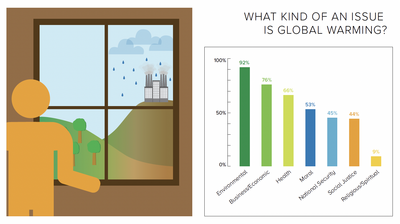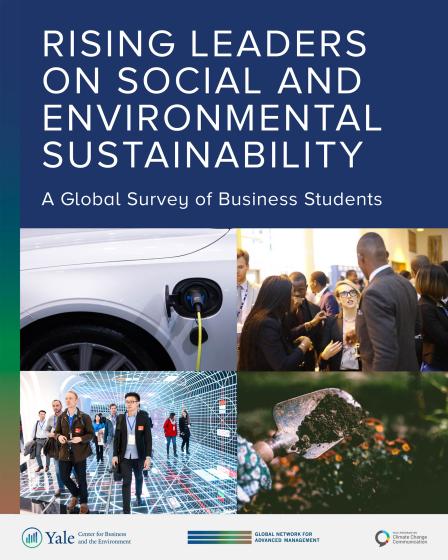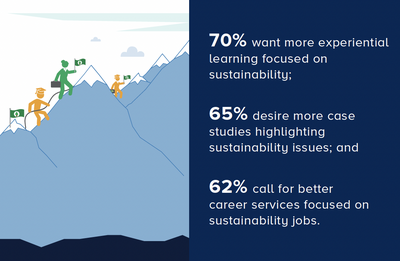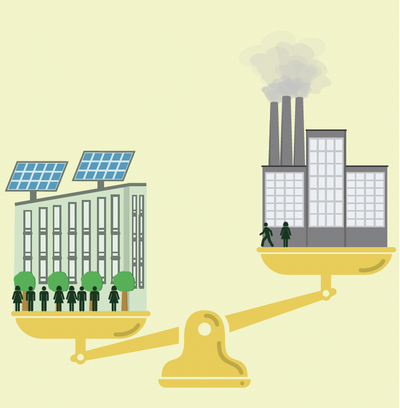


The Yale Center for Business and the Environment's just-released study of 2,035 global business students found students increasingly believe that business leaders and the private sector should play a vital role in addressing environmental sustainability and social issues.
The survey, Rising Leaders on Social and Environmental Sustainability, conducted in partnership with the Global Network for Advanced Management, and the Yale Program on Climate Change Communication, spoke with students from 32 business schools in the Global Network for Advanced Management, located in 30 countries across six continents.
This follow-up to our 2015 inaugural report, Rising Leaders on Environmental Sustainability and Climate Change, sought to deepen the understanding and nuance of rising leaders' beliefs and thoughts on climate change, the environment and sustainability, and social responsibility in the business sector.
Since then, we’ve seen a significant increase in the students who said they felt very or extremely knowledgeable about environmental sustainability (41%)—compared to 21% in 2015.
In addition to this increase in perceived understanding, we identified four key findings:

FINDING #1: Business students believe corporate leaders should be solving environmental and social issues—but they perceive the most serious issues to be elsewhere, no matter where they live in the world.
Students strongly believe global warming to be a business issue (76%)—even more than a health issue (66%), a moral issue (53%), or a social justice issue (44%).
However, students are consistently more likely to see global warming as a distant problem than a local one— which may also suggest that business students do not yet fully appreciate their role as powerful and critically necessary change agents.

FINDING #2: Business students expect sustainability to be threaded throughout corporations’ highest priorities—not treated as a stand-alone top priority.
About three-quarters of student respondents said that companies have the majority or an equal role to governments in addressing social and environmental crises. However, survey responses indicate that business students are not calling for a full reordering of business priorities; rather, they want interwoven priorities that include environmental and social considerations.

FINDING #3: Business schools are integrating sustainability topics, but students are calling on them to go further.
Though business schools that have taken strides to integrate sustainability topics into the curriculum – likely contributing to the increase in perceived knowledge around environmental sustainability issues – 70% of survey respondents want more experiential learning focused on sustainability; 65% desire more case studies highlighting sustainability issues; and 62% call for better career services focused on sustainability jobs.

FINDING #4: The ‘carbon tax on talent’ continues to rise: Now, the majority of business students state that they would accept a lower salary to work with a sustainability-forward employer.
When it comes to this intention, students appear willing to put their money where their values are. Just over half (51%) say they are willing to accept a lower salary to work for a company with better environmental practices—up from 44% of respondents in 2015. The proportion rises to 54% when students consider working for a company with strong social responsibility.
This new research gives an indication of how rising leaders are thinking about the future in a time when society is changing rapidly and the picture that emerges from the results is one of increasing complexity and nuance. However, we believe the nuance in these opinions reflects the growing maturity of sustainability as a concept in business, and of future leaders’ understanding of it.
Our students will soon be at the helms of such impactful organizations, and it is incumbent on us to equip them with the knowledge, the resources, and the networks to pursue positive and ambitious change for society.”
We hope that our updated report can help corporations, business schools, and a new generation of leaders feel emboldened to take action as they step into a future that is demanding that they find ways to keep up with this change.
Read the full report here.